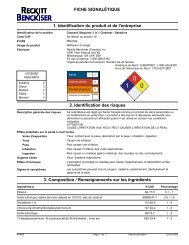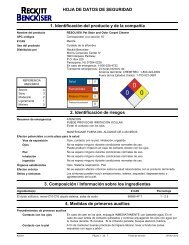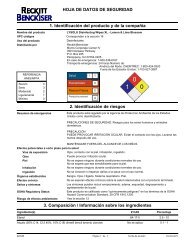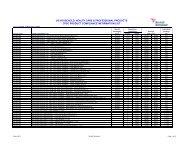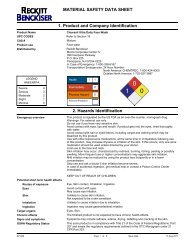Sustainability Report 2010.pdf - Reckitt Benckiser
Sustainability Report 2010.pdf - Reckitt Benckiser
Sustainability Report 2010.pdf - Reckitt Benckiser
You also want an ePaper? Increase the reach of your titles
YUMPU automatically turns print PDFs into web optimized ePapers that Google loves.
Contents<br />
Introduction<br />
Environment<br />
Marketplace<br />
Workplace<br />
Community<br />
Managing & <strong>Report</strong>ing<br />
Identifying material issues<br />
We use a process aligned to Accountability’s<br />
5-Part Materiality Test to confirm our<br />
assessment of the most material sustainability<br />
issues for our business. To do this, we have<br />
sought to identify and analyse:<br />
• our ‘significant aspects’, which are the<br />
ways in which our activities, and our<br />
suppliers and products, materially interact<br />
with the environment, society and the<br />
economy. We identify these aspects<br />
through our Group environmental and<br />
health and safety management systems,<br />
through involvement in sector and industry<br />
sustainability programmes, and by taking<br />
advice from experts.<br />
• the Environmental, Social and Governance<br />
(ESG) risks that could affect our business.<br />
We have comprehensive processes in place<br />
to identify and understand financial and<br />
non-financial risks, through the day-today<br />
activities of functions such as Internal<br />
Audit, Global Business Intelligence (GBI) and<br />
Group Environment and Health & Safety;<br />
and through the Board’s regular review of<br />
ESG matters and reputational risks.<br />
• the issues of greatest concern to our<br />
stakeholders, identified through our<br />
ongoing and specific engagement with<br />
key stakeholders. (see page 30)<br />
• the issues that society has identified as<br />
important, through regulation, legislation,<br />
and institutionalised standards.<br />
• those issues covered by our existing<br />
policies and commitments, such as<br />
our Carbon20 programme.<br />
Areas of potential risk<br />
Our Annual <strong>Report</strong> and Financial Statements<br />
2010 identify three areas of potential ESG<br />
risk, and one environmental matter, which<br />
are necessary to an understanding of the<br />
business of the Company:<br />
• Industry sector and product safety /<br />
regulatory risks.<br />
• Supply chain risks.<br />
• Product quality risks.<br />
For more information, please see:<br />
www.rb.com/Investors-media/Investorinformation/Online-Annual-<strong>Report</strong>-2010<br />
Strategic priorities<br />
The aspects and risks we have identified<br />
are common to fast moving consumer goods<br />
(FMCG) companies with well-known brands<br />
and are essentially determined by our industrial<br />
sectors (Household, Health & Personal Care)<br />
and the products we make and sell.<br />
Our strategic priorities therefore remain:<br />
• to achieve continual improvement in<br />
our overall environmental performance,<br />
focusing on those issues where we<br />
can make a significant difference.<br />
• to manage our business in a socially<br />
and ethically responsible manner.<br />
We report on all of these issues in this<br />
report and have management and<br />
improvement programmes in place<br />
across them all, at Group, regional<br />
and /or local levels.<br />
Significant aspects of our sustainability programme<br />
Environmental<br />
• Energy use / air emissions and their contribution to climate change<br />
• Raw material use and supply chain sustainability<br />
• Water use and discharges<br />
• Waste and packaging reduction, re-use and recycling<br />
• Product use and product / packaging disposal<br />
• Indirect supply chain impacts<br />
Social & Ethical<br />
• Products which improve hygiene and health<br />
• Product safety and quality<br />
• Health and safety at work<br />
• Employment practices and human rights<br />
• A responsible and ethical supply chain<br />
• Community involvement<br />
• Ethical business conduct<br />
Economic<br />
• Economic value and cash value added generated and shared<br />
with employees, shareholders and society<br />
• Indirect economic impact<br />
RB <strong>Sustainability</strong> <strong>Report</strong> 2010 29



